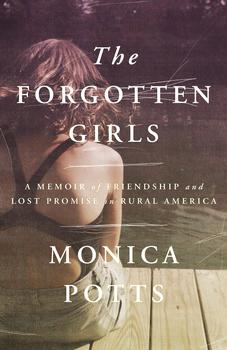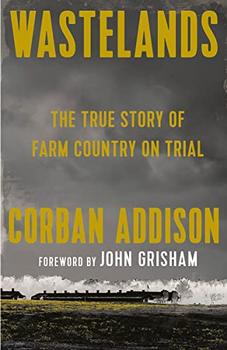Summary | Excerpt | Reading Guide | Reviews | Beyond the book | Read-Alikes | Genres & Themes | Author Bio

A Coal Country Fight against the Drug Companies That Delivered the Opioid Epidemic
by Eric EyreWhen Eric Eyre, investigative and statehouse reporter for the Charleston Gazette-Daily, began covering the opioid crisis in 2013, it started as a local issue: West Virginia Attorney General Patrick Morrisey's inauguration party was funded by Cardinal Health, the Fortune 500 company that was facing charges linked to prescription drug abuse. By 2017, Eyre's continued exposure of the opioid epidemic and those responsible for it won him the Pulitzer Prize. Death in Mud Lick is Eyre's look back at what's happened in West Virginia in light of new data on the damage done by drug distributors.
The book starts with a tragedy: Debbie Preece's path to find retribution for the death of her brother, William "Bull" Preece. Bull died in 2005 at the age of 45 from oxycodone intoxication. After a fall in the coal mine where he worked in 2000, he became addicted to OxyContin and Lortab. At the time of his death, he had five times the lethal limit in his system. The prescriber, Dr. Donald Kiser, had already moved his practice out-of-state due to federal charges against him. When Bull died, there was nothing in his medical chart from Dr. Kiser — not even an MRI from the initial emergency room visit — to demonstrate the extent of his injury or the need for medication. Kermit, West Virginia's Save-Rite Pharmacy filled these scripts without question. In fact, owner Jim Wooley gave away free popcorn and soda to the droves of people who came to his pharmacy to fill their questionable prescriptions, as if running an illicit tourist attraction. In a mere three years, Kermit was shipped 12 million hydrocodone pills for the town's population of 382. This was bigger than Bull.
Debbie Preece's legal actions against Sav-Rite Pharmacy and its owner Jim Wooley encouraged other locals to demand addiction treatment resources and legal accountability for the opioid crisis. When Eyre's reporting gained traction, journalists in other impoverished, rural coal communities took notice of the similarities in their own hometowns.
As a pattern emerged, Eyre's focus shifted to the supply chain, rather than the individual doctors who wrote the prescriptions and the pharmacies that filled them. Some of the biggest drug distributors, including McKesson, Cardinal Health, and Amerisource, were failing to regulate shipments, increasing prescription caps, and pushing sales. Other people who had lost loved ones started their own lawsuits, and the state of West Virginia took legal action on behalf of the public.
In Eyre's coverage of these developments, he discovered that drug distributors had been exploitatively profiting from the suffering of citizens since they first introduced these new narcotics. Pharmacy reps descended on vulnerable communities with high rates of manual labor injury, poverty and isolation to push the newly developed OxyContin, specifically seeking demographics of people more likely to develop addiction. The reps were also armed with sensitive data about doctors' patients and their existing conditions. They told prescribers that it would be "malpractice" to refuse prescribing these innovative, pain-reducing medications.
Eyre's reporting challenges readers to reconsider the nature of the opioid crisis in the United States. In revealing the failures of pharmacies, distributors, manufacturers, doctors, politicians and regulating boards, he makes the case that corporate greed has human causalities. This disease is not just uncontrolled but encouraged by those profiting from it.
Where Death in Mud Lick falls short is in its scope. Eyre has successfully described the complexity of the issue and the seemingly impossible path towards legal accountability, but a look at potential solutions would have been helpful. If legal action is not enough, how can corporate greed and corruption be eliminated from healthcare? Does a privatized healthcare system have the means to effectively resolve this public health crisis? How can addiction treatment and prevention be tailored to rural communities? Thus far, no new drug recovery centers are being built in Kermit. Little money is allocated to small towns for healthcare objectives. The structural issues — manual labor injuries, poverty and isolation — are not being confronted. These problems remain, and despite Eyre's efforts to raise awareness, there is little insight into possible directions for moving forward.
That said, by looking at the opioid epidemic as a multifaceted public health matter, Eyre is successful in bringing visibility to the issue and its many layers. He places it in a national context, sharing not only West Virginia's specific relationship with opioids, but also data about nationwide drug distribution. Thanks to his investigative work, the public has new information showing a side of addiction that is seldom understood, one that looks beyond individuals and into the larger systemic factors that make this problem a pattern, particularly in rural and industrial regions of the United States.
For more information about Death in Mud Lick and Eric Eyre's work, check out his interview with 100 Days in Appalachia.
![]() This review was originally published in The BookBrowse Review in May 2020, and has been updated for the
May 2021 edition.
Click here to go to this issue.
This review was originally published in The BookBrowse Review in May 2020, and has been updated for the
May 2021 edition.
Click here to go to this issue.

If you liked Death in Mud Lick, try these:

by Monica Potts
Published 2024
Talented and ambitious, Monica Potts and her best friend, Darci, were both determined to make something of themselves. How did their lives turn out so different?

by Corban Addison
Published 2023
As vivid and fast-paced as a thriller, Wastelands takes us into the heart of a legal battle over the future of America's farmland and into the lives of the people who found the courage to fight.
Your guide toexceptional books
BookBrowse seeks out and recommends the best in contemporary fiction and nonfiction—books that not only engage and entertain but also deepen our understanding of ourselves and the world around us.